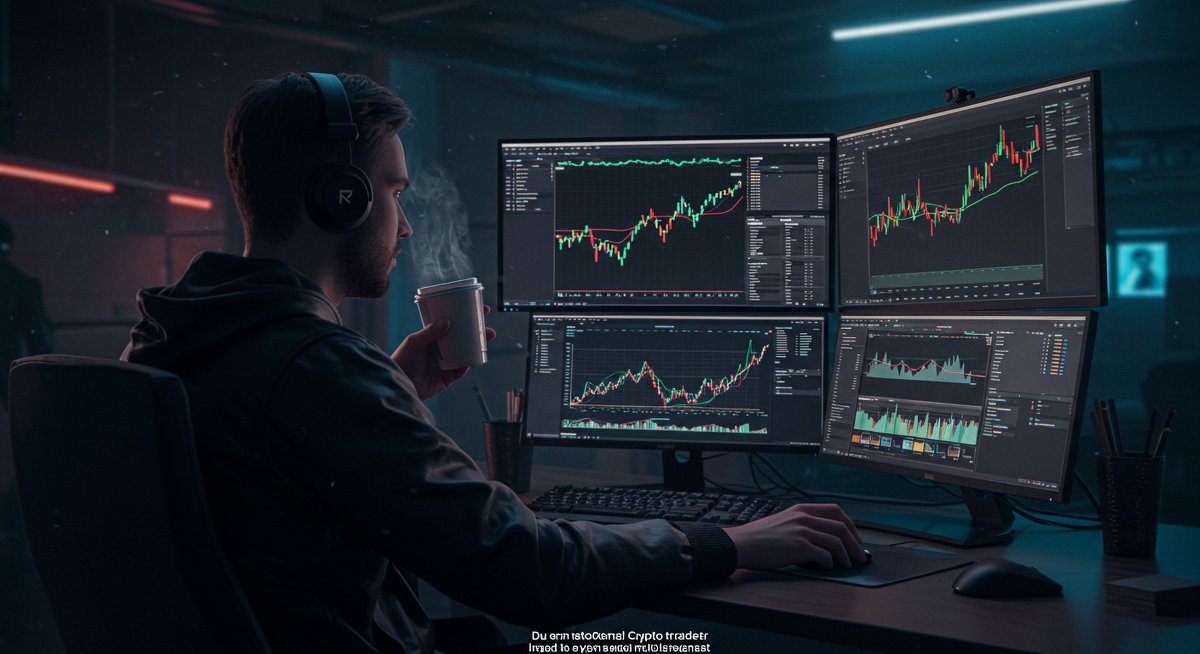This Reddit Post Got Me Thinking...
So, I was browsing r/CryptoMarkets the other day, and a post about Ethereum ETFs caught my eye. The user pointed out that despite a lack of hype, ETH ETFs have been experiencing significant inflows, with minimal price movement. This got me thinking: are we on the verge of a potential breakout, similar to what happened with Bitcoin earlier this year? Or is this a false alarm? It’s easy to get caught up in the daily price swings and meme coin mania, but sometimes the real opportunities are brewing beneath the surface. I’ve seen this happen before, where steady accumulation precedes a significant price jump. What made this particular post interesting was the focus on the sheer volume of inflows and the concentration in specific funds, like BlackRock's ETHA.
That kind of focused accumulation usually signals institutional interest, and institutions don't typically move on a whim. They're in it for the long haul. So, if institutions are quietly loading up on ETH through ETFs, it's worth digging deeper to understand what it could mean for the rest of us. This isn't just about whether ETH will go up or down in the short term. It's about understanding the underlying dynamics of the market and how institutional behavior can influence price trends.

BlackRock's ETHA is Eating Up ETH Supply
The original Reddit post highlighted a few key things. First, the consistent inflows into ETH spot ETFs, totaling $9.33 billion since launch. Second, the concentration of these inflows in BlackRock's ETHA, which alone holds over $10.69 billion. Third, the increasing trading volume across these ETFs, indicating real activity beyond just accumulation. Let's break this down a bit further. The fact that ETH ETFs have captured 4.6% of ETH's total market cap is significant. It means that a sizable chunk of ETH is now locked up in these investment vehicles, reducing the available supply on exchanges. And if demand for ETH continues to rise, this reduced supply could put upward pressure on the price.
BlackRock's ETHA is particularly interesting because of its size and the speed at which it has accumulated assets. When a single fund controls such a large portion of the ETF market, it can have a disproportionate impact on the underlying asset. In this case, ETHA's aggressive accumulation suggests that BlackRock sees long-term value in ETH. They're not just dipping their toes in the water; they're diving in headfirst. It's also worth noting the contrast between the inflows into ETHA and the outflows from Grayscale's ETHE. This suggests a shift in investor preference towards ETFs with lower fees and greater liquidity. Investors are moving away from older, less efficient products and towards newer, more competitive options. Even with Grayscale's bleed, the overall ETH ETF flows are still very green. This shows that organic demand is overpowering the legacy outflows.
What This ETF Action Could Mean for Your Portfolio
So, what does all of this mean for you, the average crypto trader or investor? Well, first and foremost, it suggests that Ethereum may be undervalued at its current price. If institutions are willing to accumulate ETH at these levels, it's a sign that they believe the price has room to grow. This doesn't guarantee that ETH will moon overnight, but it does provide a bullish signal. Second, it highlights the importance of paying attention to institutional flows. These flows can often be a leading indicator of future price movements. By tracking ETF inflows and outflows, you can get a sense of where institutional money is moving and adjust your portfolio accordingly.
However, it's important to remember that institutional flows are just one piece of the puzzle. You also need to consider other factors, such as market sentiment, regulatory developments, and technological advancements. Don't rely solely on ETF data to make your investment decisions. Instead, use it as one input among many. If you're already holding ETH, this news is likely reassuring. It suggests that your investment thesis is still valid and that there's potential for further upside. If you're not holding ETH, this could be a good opportunity to start building a position. However, be sure to do your own research and assess your risk tolerance before investing. Don't FOMO in just because institutions are buying.
The Stuff Nobody Talks About: The Risks of ETFs
Now, let's talk about the stuff nobody likes to talk about: the risks. While ETH ETFs offer a convenient way to gain exposure to ETH, they're not without their drawbacks. One of the biggest risks is the potential for tracking error. ETFs are designed to track the price of the underlying asset, but they don't always do so perfectly. This can be due to a variety of factors, such as fees, expenses, and the ETF's trading strategy. Over time, these tracking errors can erode your returns. Another risk is the potential for market manipulation. While ETFs are generally well-regulated, they're not immune to manipulation. Large players could potentially use ETFs to influence the price of the underlying asset, to their own benefit.
It's also important to consider the tax implications of investing in ETFs. Depending on your location, you may be subject to capital gains taxes on any profits you make from selling your ETF shares. Be sure to consult with a tax advisor to understand the tax implications of your investments. Finally, remember that ETFs are just one type of investment vehicle. They're not a magic bullet. Diversification is still key to managing risk. Don't put all your eggs in one basket, even if that basket is an ETH ETF. Spread your investments across different asset classes and cryptocurrencies to reduce your overall risk exposure. Don't get emotional with ETF investments. When markets are tanking, it can be tempting to try and cash out. However, this usually results in more significant losses.
If You're Trading from Outside the US: Local Regulations Matter
If you're trading crypto from outside the US, there are a few additional things to keep in mind. First, regulations vary widely from country to country. In some countries, crypto trading is perfectly legal and well-regulated. In others, it's still a gray area. And in a few, it's outright banned. Be sure to research the regulations in your country before you start trading. Ignorance is not an excuse, and you don't want to end up on the wrong side of the law.
Second, tax laws also vary significantly. Some countries have specific crypto tax laws, while others treat crypto as property or income. Again, it's important to understand the tax implications of your trading activities in your country. Consult with a tax advisor if you're unsure. Third, access to crypto exchanges and ETFs may be limited in some countries. Some exchanges may not be available in your country, or they may not offer the same products and services as they do in other countries. Be sure to check the availability of exchanges and ETFs in your country before you start trading. Finally, remember that currency exchange rates can impact your returns. When you're trading crypto in a foreign currency, you're subject to fluctuations in the exchange rate. This can either enhance or detract from your profits. Keep an eye on exchange rates and factor them into your trading decisions. If you plan to trade using platforms like KuCoin, it is crucial to check their availability and regulatory compliance within your specific jurisdiction.

Actually Doing This Stuff: A Step-by-Step Guide
Okay, so how do you actually take advantage of this information and start trading ETH ETFs? Here's a step-by-step guide:
- Do Your Research: Before you invest in any ETF, be sure to do your own research. Read the ETF's prospectus, understand its investment strategy, and assess its risk factors. Don't just blindly follow the herd.
- Choose a Broker: Select a reputable broker that offers access to ETH ETFs. Consider factors such as fees, commissions, and platform usability.
- Fund Your Account: Deposit funds into your brokerage account. You can typically do this via bank transfer, credit card, or other payment methods.
- Place Your Order: Once your account is funded, you can place an order to buy ETH ETF shares. You can choose to place a market order (which executes immediately at the current market price) or a limit order (which executes only when the price reaches a certain level).
- Monitor Your Investment: After you've bought your ETF shares, keep an eye on their performance. Track the ETF's price, volume, and news to stay informed.
- Rebalance Your Portfolio: Periodically rebalance your portfolio to maintain your desired asset allocation. This may involve selling some of your ETF shares and buying other assets.
If you are a beginner, consider exploring user-friendly platforms like Changelly to get started. These platforms often provide simpler interfaces and educational resources to help new traders navigate the crypto space.
My Take on All This: Cautious Optimism
Here's what I think. I'm cautiously optimistic about the future of Ethereum. The consistent inflows into ETH ETFs are a positive sign, and they suggest that institutions are taking ETH seriously. However, I'm not convinced that ETH is guaranteed to moon. There are still plenty of risks and uncertainties in the crypto market, and anything could happen. I think ETH is a solid project with a lot of potential, but it's not without its flaws. The high gas fees are still a major barrier to adoption, and the transition to Proof-of-Stake has been slower than expected.
Ultimately, whether or not you invest in ETH is a personal decision. You need to weigh the risks and rewards and decide what's right for you. But if you do decide to invest, be sure to do your research, manage your risk, and stay informed. The crypto market is constantly evolving, and you need to be prepared to adapt to changing conditions. Maybe I'm wrong about all of this. Maybe the ETH ETF inflows will dry up, and the price will crash. But even if that happens, I'll still be here, learning and adapting. That's the beauty of the crypto market. There's always something new to discover.